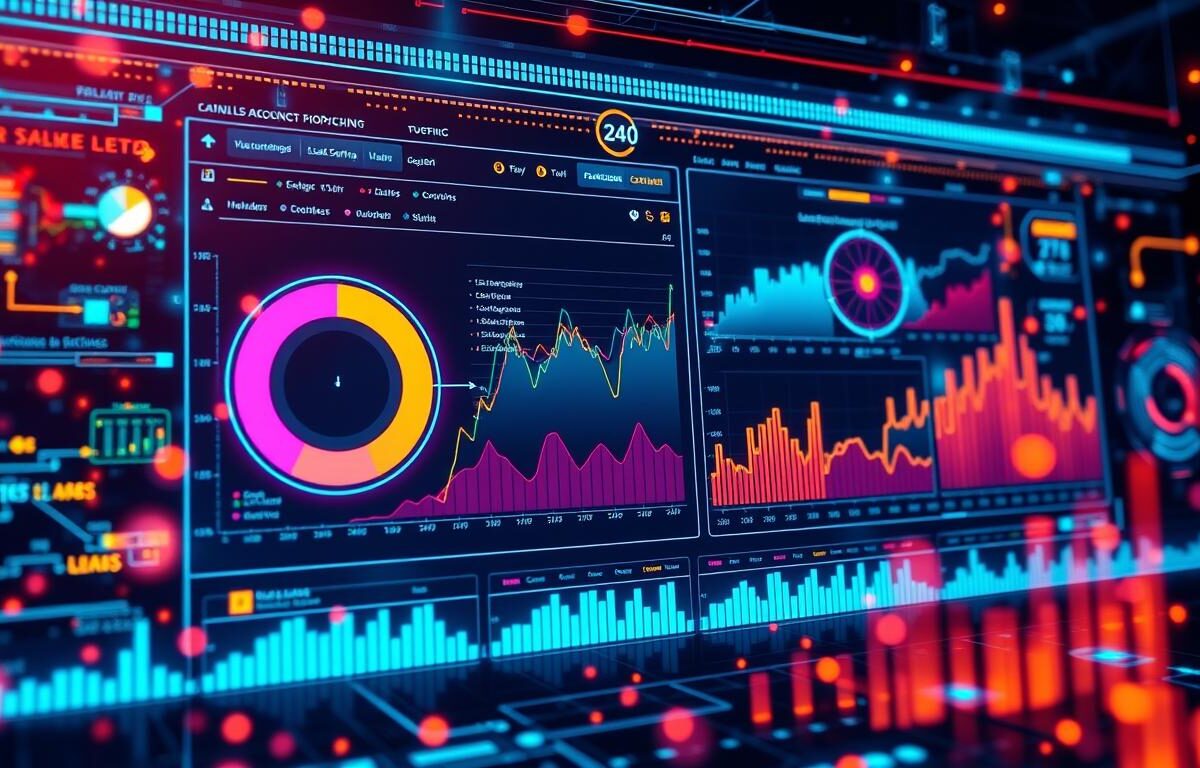Using intelligent sales lead scoring algorithms can boost your ROI in sales and marketing. These smart solutions use AI to prioritize leads better. They automate how we evaluate leads and use machine learning to make more accurate predictions.
When sales teams adopt these advanced models, they make smarter decisions about which leads to focus on. This means they’re more likely to succeed in turning potential customers into actual ones.
These algorithms look at lots of different types of data. This includes where people come from and how they behave online. By doing this, sales efforts become more timely and relevant. And they help make sure our marketing strategies are more effective in leading to success.
Key Takeaways
- AI-powered lead scoring algorithms offer a higher degree of accuracy in predicting lead conversion potential.
- Advanced lead scoring models enable sales teams to prioritize with precision, conserving resources for high-potential engagements.
- Seamless CRM integration aids in the real-time application of scoring insights to drive sales initiatives.
- Continuous learning from behavioral data ensures the scoring system evolves, enhancing efficiency over time.
- Companies like HubSpot and Marketo employ AI lead scoring to maximize the impact of marketing outcomes and sales productivity.
- Technologies from Pardot to Demandbase demonstrate the diverse applications and benefits of intelligent lead scoring across various platforms.
- Having a nuanced understanding of predictive analytics and machine learning algorithms aids in building robust scoring systems.
Understanding Intelligent Sales Lead Scoring Algorithms
In today’s data-driven sales environments, using machine learning algorithms and behavioral analysis is key. This helps make lead management better and more accurate. Looking into intelligent sales lead scoring systems boosts operation efficiency and targeting.

Definition and Importance
Intelligent sales lead scoring algorithms use data analytics, AI-driven predictions, and predictive lead scoring. They rank potential customers based on many factors like demographics and buying intent. This helps predict if a lead will become a paying customer. These algorithms are very important. They give deep insights, allowing businesses to focus on their ideal customers.
How They Work
These algorithms analyze lots of data to find patterns and predict future actions. They use machine learning lead scoring. This includes both clear criteria, like job titles, and important behavior data. This behavior data shows true buying interests. According to innovative predictive analytics solutions, these algorithms get better over time. They adjust to market changes.
Key Features
The main features include automated lead scoring, real-time updates, and account-based scoring. Quick updates ensure scoring is always right. They also allow for better marketing and sales plans by finding engaged prospects.
Using these advanced lead scoring strategies brings sales and marketing teams closer. They must work together to set the right scoring criteria. Doing so makes sure follow-ups are effective and aligned with goals.
| Statistic | Percentage | Year |
|---|---|---|
| AI recognized as mainstream in offices | 86% | 2021 |
| Revenue increase due to AI in marketing and sales | 70% | Not specified |
| Companies using AI for data quality issues | 48% | Not specified |
Benefits of Using Intelligent Algorithms in Lead Scoring
AI-powered lead scoring changes how businesses find and target potential customers. It uses smart data analysis and predictions. This helps companies find the best prospects effectively and efficiently.
Enhanced Targeting and Personalization
These smart algorithms look at tons of data like who people are, what they do, and how they interact with you. The scoring process is automatic. It looks at every detail, so marketing messages hit the mark with each person.
Improved Sales Team Efficiency
AI lead scoring makes finding promising leads easier and faster. Salespeople spend their time on leads more likely to buy, not on those that won’t. This makes sales teams more productive and helps the company run better.
Higher Conversion Rates
AI keeps getting smarter and makes better guesses on who will buy. This means teams can talk to the right people at the right time. Success goes up because the approach is smarter and more focused.
The table below shows how AI scoring beats the old ways:
| Feature | Traditional Lead Scoring | AI-Powered Lead Scoring |
|---|---|---|
| Data Points Analyzed | Limited (demographic, basic behavioral) | Extensive (multi-source, real-time behavioral, engagement) |
| Accuracy | Lower due to manual setup | High with continuous learning |
| Efficiency | Time-intensive, less focused | Highly efficient, focused on high-quality leads |
| Scalability | Limited scalability | Adapts and scales with business growth |
| Conversion Rates | Lower potential | Increased rates due to precision targeting |
Implementing Intelligent Sales Lead Scoring Algorithms
For companies wanting to boost their market strategy, moving to smart lead scoring algorithms is key. These AI-driven tools and deep analytics change how leads are managed. They make the lead process much better.
Identifying Your Business Needs
Starting with lead scoring means knowing your business goals and who you want to reach. You must identify which behaviors and characteristics match your perfect customers. This ensures your scoring models are spot-on, making AI lead qualification more accurate.
Choosing the Right Technology Platform
It’s crucial to pick the right marketing tech. Systems like HubSpot, Marketo, Pardot, and Salesforce Einstein integrate well with CRM. They have AI tools that improve and automate lead scoring. Using these lets businesses use data and analytics better to make smarter decisions.
Steps for Integration
Integrating automated lead scoring starts with several important actions. First, you must set up the lead scoring model on platforms like HubSpot or Marketo. It should match your business aims. Then, keep an eye on it and tweak as needed to make sure it’s working well.
Using tools like Act-On and integrating Salesforce Einstein streamlines the process. It links sales and marketing efforts, focusing on the leads that matter most. This focus is vital for doing well in a crowded market.

By using AI in lead scoring, businesses gain an advantage. They can interact more personally and effectively with potential clients. This leads to more sales and less wasted effort on unlikely leads.
Always look to improve and learn from the data. This will fine-tune your marketing strategy. It keeps your business ready to meet changing market and customer needs.
Real-World Applications of Lead Scoring Algorithms
AI-driven lead scoring systems are making big changes in various fields. They increase efficiency and sales productivity. Fields like e-commerce and healthcare are using AI to change how they handle leads. Let’s look at some stories of how marketing automation has really changed the game.
Case Studies from Successful Companies
Both big corporations and startups have seen huge benefits from focusing on lead prioritization. For example, U.S. Bank saw its lead conversion rates jump by 260% with Salesforce Einstein. This shows how AI can really boost marketing in the financial sector. Similarly, those who used HubSpot’s AI tools saw a 451% rise in qualified leads. This highlights the power of AI in getting customers for SaaS (Software as a Service).
Industry-Specific Implementations
In e-commerce, AI has been a game changer. Amazon, for instance, saw a 35% increase in revenue after using AI for product suggestions. This greatly improved how they engage and retain customers. In healthcare, marketing automation has helped bring in a new era of personalization and patient outreach. AI tools help healthcare providers manage data to better reach and engage patients.
| Company | Technology Used | Increase in Lead Conversion Rates | Impact on Sales Productivity |
|---|---|---|---|
| U.S. Bank | Salesforce Einstein | 260% | Noted improvement in marketing qualified leads (MQLs) |
| HubSpot Users | HubSpot’s AI Tools | 451% in qualified leads | Increased engagement and follow-ups |
| Amazon | AI-Powered Recommendations | 15% in conversion | Revenue boost by 35% |
| Healthcare Providers | Custom Healthcare Automation Systems | Data management efficiency | Enhanced patient engagement |
The use of AI in lead scoring shows us how flexible AI technology is for different industries. It also points out how important data-driven methods are in improving how we get and keep customers. No matter the field, scoring and prioritizing leads well can really change the game for sales and marketing. This leads to better results and operations that run more smoothly.
Future Trends in Sales Lead Scoring
Businesses are always changing, especially with new technology. Evolving machine learning techniques and AI advancements in marketing are big influences. They make predicting which leads are likely to buy something easier. This helps sales teams work smarter, not harder.
The way we score leads for sales is getting better and quicker. It is also changing how sales tactics work with market changes.
Advances in Machine Learning and AI
AI-driven automation makes a sales team’s job easier by cutting down on routine tasks. At the same time, conversational AI and natural language processing (NLP) make talking to customers better and faster. These improvements lead to more sales.
Predictive and adaptive future lead scoring models show how important AI is. They make sales efforts more effective by focusing on the most promising leads. As these systems get better, we’ll see even more connection and smarter AI.
The Role of Data Privacy and Ethics
Using more personal data in data privacy lead scoring and AI means we have to talk about ethics. It’s crucial to follow rules like GDPR and be transparent about how data is used. Balancing the power of AI with respecting privacy is key.
Predictions for the Next Five Years
The next five years will bring a big focus on personalized, data-driven lead scoring with AI. Using intent-based scoring lets businesses target leads ready to buy. This makes the sales process smoother.
Automated lead nurturing with AI can increase successful sales chances by making things efficient. Expectations include a 75% rise in conversion rates and sales cycles 30% faster. This proves how effective AI advancements in marketing can be.
This smarter way of scoring leads could greatly improve marketing ROI. It relies on targeting accurately and spending less on weaker leads. We’re moving towards better predictive accuracy and excellence in operations.
FAQ
What are intelligent sales lead scoring algorithms?
Intelligent sales lead scoring algorithms look at potential customers differently. They check things like where people come from, their job, behavior, and how likely they are to buy something. These systems use AI and machine learning to make sorting leads faster and better. This helps marketing and sales work more efficiently.
How do intelligent sales lead scoring algorithms work?
These algorithms study a lot of data to find buying patterns. They use machine learning to evaluate customer details. This includes where they’re from, what they’ve done before, and what they might do next. As they learn from new data, these models get better at guessing who’s likely to make a purchase.
What are key features of intelligent sales lead scoring algorithms?
Important features include predicting the future, learning from data, understanding behaviors, and adjusting scores based on real info. They also add more insights into lead data and make smart predictions. This turns real-time data into a tool for finding the best leads to follow up on.
What benefits do intelligent algorithms provide in lead scoring?
Intelligent algorithms make it easier to reach the right people and help sales teams work better. They increase the chances of making a sale by using smart tech to sort leads. This leads to smarter decision-making and higher productivity for sales teams.
How do you identify business needs for implementing intelligent lead scoring?
To start, know who you want to sell to and what you want to achieve. Find out what makes your best customers tick. This will help tailor your intelligent lead scoring to fit your product or service needs.
What is the process for choosing the right technology platform for lead scoring?
Choosing the right platform means looking for one with smart AI tools. This can be HubSpot, Marketo, Pardot, or Salesforce Einstein. Make sure it works well with what you already have. It should help, not hinder, your marketing plan.
What are the steps for integrating intelligent sales lead scoring algorithms?
Start with setting up your tech platform. Then, tweak the model to match your business goals. Connecting it with your existing CRM or marketing tools is key. Keep an eye on performance to keep improving your lead scoring.
How are intelligent sales lead scoring algorithms applied in real-world scenarios?
Real examples include Accenture and Harvard University shortening sales times and getting more inquiries. These techs are used in many fields. They help with lead management, getting new customers for software companies, and automating marketing in healthcare.
What are future trends likely to be seen in sales lead scoring?
Expect better machine learning and AI for more precise scoring. Privacy and ethical handling of data will get more attention. Plus, innovations in predicting lead quality and scoring leads right away will keep up with changing customer actions.
What are the implications of AI and data privacy on sales lead scoring?
Using personal and behavior data makes following laws like GDPR key. It’s important to use data right while keeping privacy in mind. Companies must find a good balance between using new lead scoring methods and protecting privacy.
What are some predictions for the lead scoring industry in the next five years?
The industry will move towards more personal, automated, and AI-driven approaches. Expect more AI use, more data sources, and abilities to score leads as customer needs change quickly.



